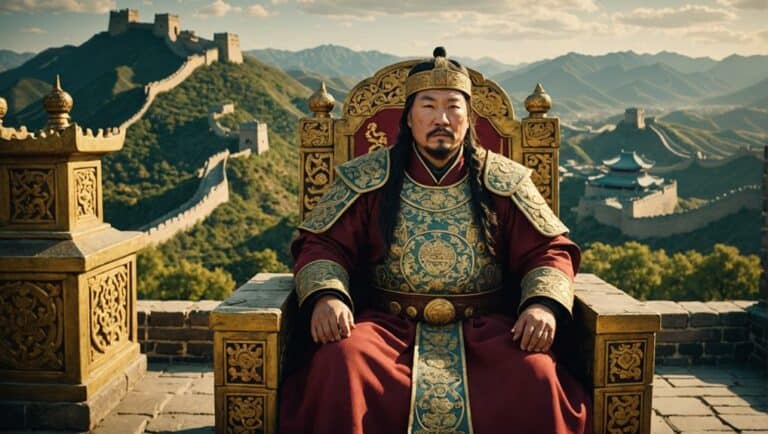Kublai Khan, Genghis Khan's grandson, masterfully blended Mongol and Chinese traditions to establish the Yuan Dynasty in 1271.
Discover how his strategic brilliance and inclusive reforms not only secured stability but also left a lasting impact on China's development.
Early Life and Background
Born in 1215, Kublai Khan grew up as the grandson of Genghis Khan, embedded in the powerful Mongol ruling family. This lineage provided him with unparalleled access to the intricacies of Mongol governance and military strategies. From an early age, Kublai was immersed in the Mongol way of life, understanding the significance of both conquest and administration. His formative years were marked by a blend of rigorous martial training and exposure to various cultures within the vast Mongol Empire.
Kublai's role as the viceroy of northern China was a pivotal phase in his early life. This position allowed him to establish a strong support network and gain valuable experience in governance. He didn't just passively receive power; he actively engaged in the administration and understood the complexities of ruling diverse populations. This period was fundamental in shaping his vision for a unified China under Mongol rule.
Campaigning in southern China with his brother Mongke further honed Kublai's military and strategic skills. He demonstrated a keen ability to integrate Mongol military prowess with Chinese administrative practices. These early experiences positioned Kublai as a formidable leader, setting the stage for the eventual establishment of the Yuan Dynasty with its capital in China.
Rise to Power
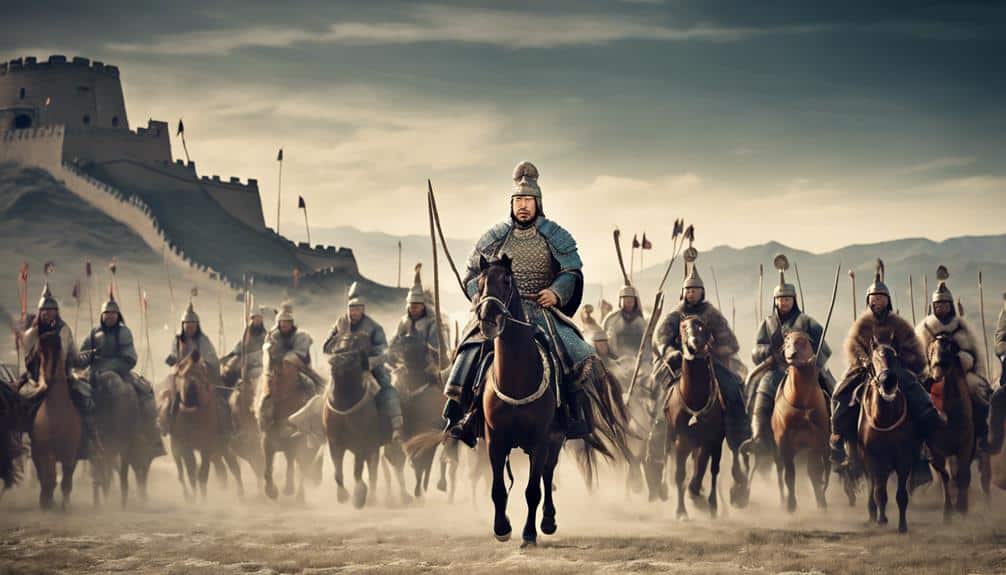
You'll find that Kublai Khan's rise to power was marked by significant leadership challenges, including a civil war against his brother Arik Boke, which he won in 1264.
This victory paved the way for him to establish the Yuan Dynasty in 1271, with Beijing as its capital.
Early Leadership Challenges
Faced with initial economic challenges after receiving a fiefdom from his uncle Ogodei Khan in 1236, Kublai Khan strategically replaced Mongol officials with Chinese advisors to stabilize and expand his influence. This decision marked a significant shift in his leadership style, reflecting his attachment to Chinese traditions and practical governance. By incorporating Chinese advisors, Kublai Khan could effectively address economic issues, demonstrating a keen understanding of the value of diverse perspectives.
His conquest of Yunnan in 1256 further solidified his control and showcased his military prowess. The successful campaign not only expanded his territory but also highlighted his strategic capabilities—key aspects of his early leadership. Kublai Khan's exposure to Chinese culture through his mother played a critical role in shaping his governance approach. This influence was evident in his decision to establish Xanadu as a new capital based on feng shui principles, blending Mongol and Chinese elements.
Kublai Khan's early leadership challenges were marked by his willingness to adapt and innovate. By leveraging Chinese advisors and embracing elements of Chinese culture, he navigated economic challenges effectively, expanded his influence, and laid the groundwork for his future successes.
Civil War Victory
Emerging victorious in the civil war against his brother Arik Boke in 1264, Kublai Khan secured his position as the Great Khan, a pivotal moment that enabled him to establish the Yuan Dynasty and consolidate his power over China. This civil war victory wasn't just a triumph over a sibling but a decisive factor that shaped Kublai Khan's legacy and the future of the Mongol Empire.
By defeating Arik Boke, Kublai Khan could assert his authority, ensuring his vision for a new governance system that blended Mongol customs with Chinese traditions. Kublai Khan's ambition to become the Chinese Emperor drove his efforts to unify the diverse regions under his control. He relocated his capital to Beijing, signaling his intent to govern China effectively.
This strategic move also facilitated cultural exchange, allowing for the integration of various administrative practices that strengthened his rule. The civil war victory was pivotal in solidifying Kublai Khan's authority, providing him with the necessary platform to implement significant reforms in governance and infrastructure. His ability to bring stability to the region and promote religious tolerance further underscored his capability as a leader, paving the way for the eventual establishment of the Yuan Dynasty.
Establishing Yuan Dynasty
Securing his victory in the civil war against Arik Boke, Kublai Khan laid the groundwork for establishing the Yuan Dynasty by officially declaring its inception in 1271 and making Beijing its capital. This strategic move not only centralized his power but also signaled his ambition to be recognized as the Chinese Emperor. Kublai Khan's vision extended beyond mere conquest; he aimed for the unification of China under his rule.
To achieve this, Kublai Khan launched a series of military campaigns against the Song Dynasty, which culminated in their defeat in 1279. This victory was pivotal, marking the complete unification of China under the Yuan Dynasty. Kublai Khan's choice of Beijing as the capital city, referred to as Daidu, was instrumental in solidifying his control. Additionally, he divided his time between Daidu and Xanadu, focusing on both governance and expansion.
Kublai Khan's efforts to establish the Yuan Dynasty involved not just military might but also administrative reforms and cultural integration. By positioning himself as a Chinese Emperor, he sought legitimacy and acceptance among the Chinese people. His rule marked a significant turning point in Chinese history, bridging Mongol and Chinese traditions.
Establishment of the Yuan Dynasty
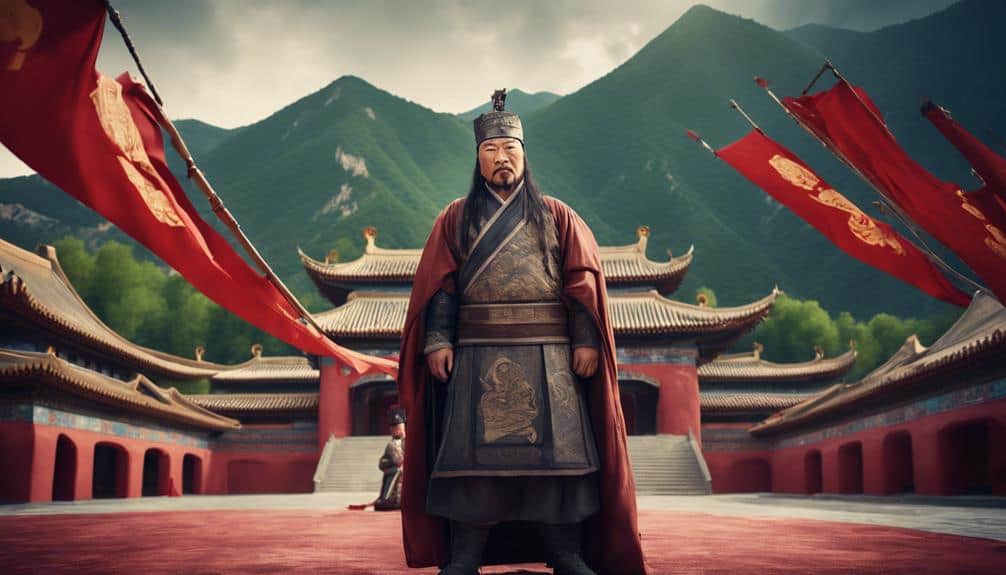
When Kublai Khan established the Yuan Dynasty in 1271, he strategically relocated the capital to Beijing, solidifying his control.
You can see his efforts to integrate Chinese administrative systems while ensuring Mongols held key positions, balancing both innovation and tradition.
This approach helped him unify China under his rule and strengthen the new dynasty's foundation.
Capital Relocation to Beijing
Kublai Khan's relocation of the capital to Beijing in 1271 marked a pivotal moment in the establishment of the Yuan Dynasty. By moving the center of the Mongol Empire to Beijing, Kublai Khan solidified his control over China and signaled a significant shift in governance and administration. This strategic decision underscored his ambition to be recognized as a Chinese Emperor and played a vital role in the consolidation of power and the uniting of China under his rule.
The capital relocation to Beijing allowed for more effective oversight of the vast territory under Kublai Khan's authority.
Beijing's establishment as the political and cultural center showcased Kublai Khan's commitment to integrating Mongol and Chinese traditions.
The move symbolized the Yuan Dynasty's legitimacy and Kublai Khan's vision of a unified China.
This relocation also facilitated better administration and governance, strengthening the Mongol Empire's influence in the region.
Kublai Khan's capital relocation to Beijing didn't just mark a geographical change; it represented a broader strategic move to consolidate his power and unify a diverse and expansive empire. By establishing Beijing as the capital, Kublai Khan laid the foundation for a centralized administration that would shape Chinese governance for generations.
Integration of Chinese Administration
The establishment of the Yuan Dynasty marked a profound integration of Chinese administrative systems with Mongol governance, fundamentally reshaping the political landscape of China. Kublai Khan skillfully merged Chinese administration with Mongol customs, creating a hybrid system. He retained traditional ministries to ensure continuity and legitimacy, while placing Mongols in key positions to consolidate his power.
Kublai Khan implemented segregation measures to prevent uprisings, forbidding intermarriage and enforcing policies that differentiated between various ethnic groups. This segregation aimed to maintain control and reduce the potential for conflict within the diverse empire.
Despite these measures, Kublai promoted the use of multiple languages and created a new official language to facilitate governance across his vast territories.
Under his rule, international trade flourished. Kublai Khan offered tax exemptions and encouraged the use of paper money, which greatly boosted economic growth. He also improved transportation infrastructure, making it easier for goods to move across the empire, thereby fostering a vibrant trade network.
Cultural and Political Reforms
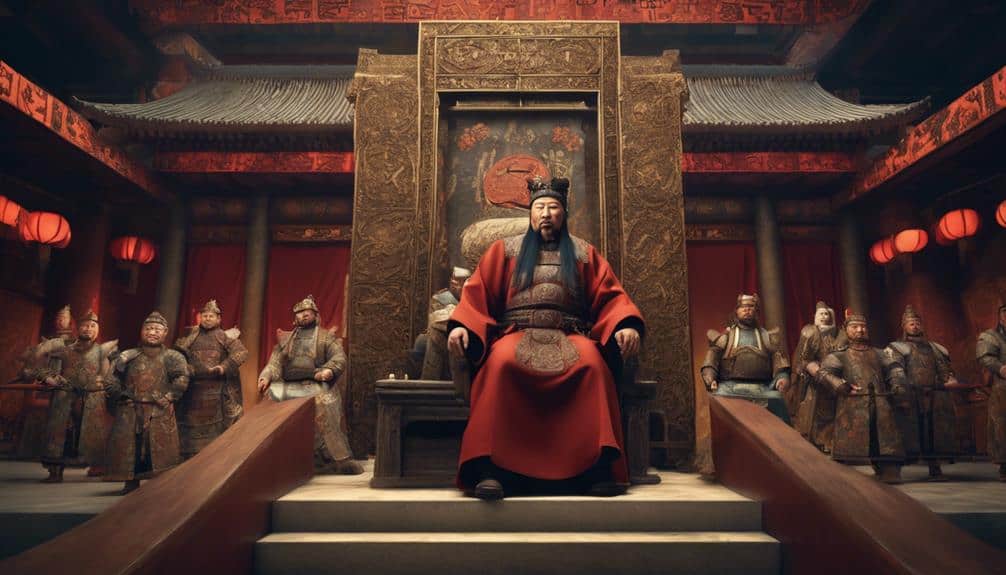
Implementing strategic cultural and political reforms, Kublai Khan sought to integrate diverse ethnic and religious groups within his empire, aiming to stabilize and strengthen his rule over China. Recognizing the importance of cultural reforms, he focused on Hebei to attract ethnic Han peasants back to the region. This move not only invigorated the local economy but also fostered loyalty among the Han populace.
Kublai Khan transformed Daoist temples into Buddhist ones, aiming to end religious conflicts and promote religious harmony. He invited Tibetan monks to his court and appointed Phagpa as his Imperial Preceptor, solidifying his support among Buddhists and enhancing his spiritual authority.
- Invigorated Hebei by attracting ethnic Han peasants.
- Transformed Daoist temples into Buddhist to promote religious harmony.
- Invited Tibetan monks to court and appointed Phagpa as Imperial Preceptor.
- Relied on Chinese advisers for administrative matters.
Kublai Khan's reliance on Chinese advisers for administrative matters underlined his pragmatic approach to governance. By adopting Chinese models, he secured more effective administration and integration of his diverse subjects.
These reforms reflect his strategic vision in consolidating power, fostering unity, and securing the stability and prosperity of his empire.
Military Campaigns and Conquests
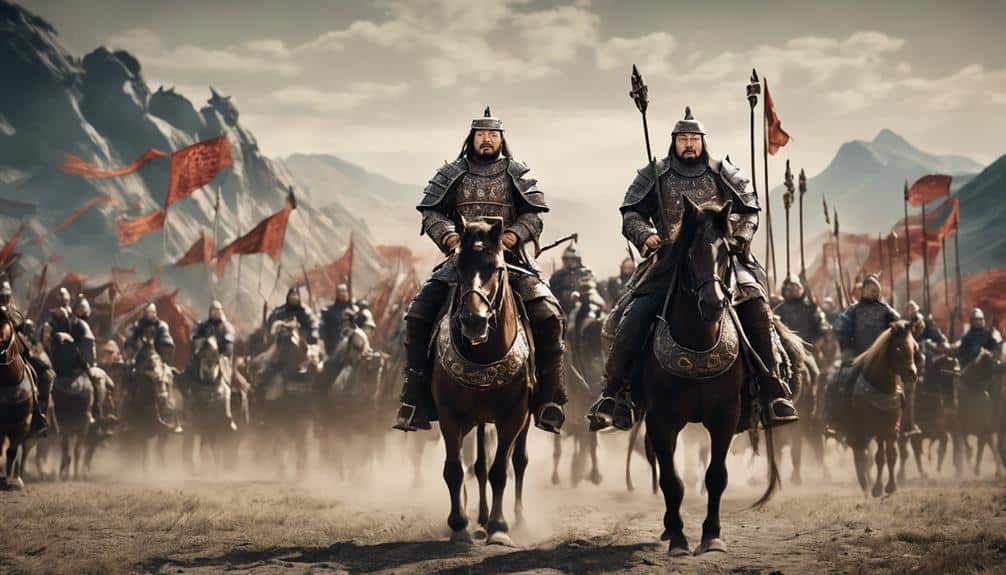
While Kublai Khan's cultural and political reforms laid the groundwork for a stable empire, his military campaigns and conquests were vital in expanding and solidifying Mongol control over China. Targeting the Song Dynasty in 1268, Kublai Khan faced significant challenges due to their strategic fortifications. His persistence paid off when the Mongol military captured Xiangyang in 1273, a key victory that paved the way for the eventual defeat of the Song Dynasty in 1279.
Kublai Khan's conquest of China wasn't just about military might but also strategic relocation. Initially, his capital was in Xanadu, but he later moved it to Daidu (modern-day Beijing). This move symbolized the Mongol rule over China and allowed better control and administration of the newly established Yuan Dynasty.
During his reign, Kublai Khan split his time between Xanadu and Daidu, consolidating his rule through continuous military campaigns and strategic governance. He implemented administrative policies that favored Mongols in key positions while retaining traditional Chinese ministries, ensuring a smooth shift and effective control over the vast territories.
These efforts were critical in maintaining the stability and expansion of the Yuan Dynasty under Mongol rule.
Legacy and Achievements
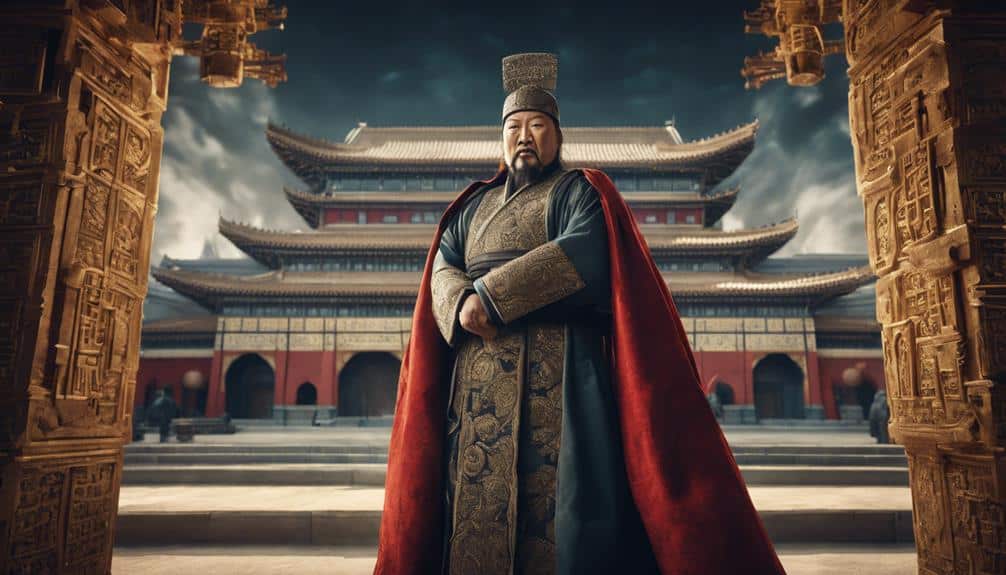
Kublai Khan's legacy is marked by his transformative contributions to China's cultural, economic, and administrative landscapes. As a Mongol Emperor, Kublai Khan unified China by defeating the Southern Song at the Battle of Yamen, bringing an end to centuries of fragmentation and establishing the Yuan Dynasty. His rule wasn't just about military might; it was also about significant administrative and economic reforms.
- Public schools: Kublai Khan established public schools, fostering advancements in science and the arts. This initiative helped in consolidating knowledge and promoting education across his vast empire.
- Paper currencies: Introducing paper currencies and creating the unified Jiaochao, Kublai Khan boosted economic growth. This innovation facilitated trade and stabilized the economy.
- Governors and vice-governors: He restructured the Yuan domains by appointing governors and vice-governors, extending his rule efficiently into regions like the Korean Peninsula and ensuring effective governance.
- Order and law: To maintain order, he declared death for followers of certain slaughtering codes, reflecting his commitment to a disciplined and orderly empire.
Kublai Khan's achievements highlight his strategic vision and administrative acumen, which left an enduring impact on China's development during the Yuan Dynasty. His reforms not only unified a fragmented nation but also set the foundations for future prosperity.


